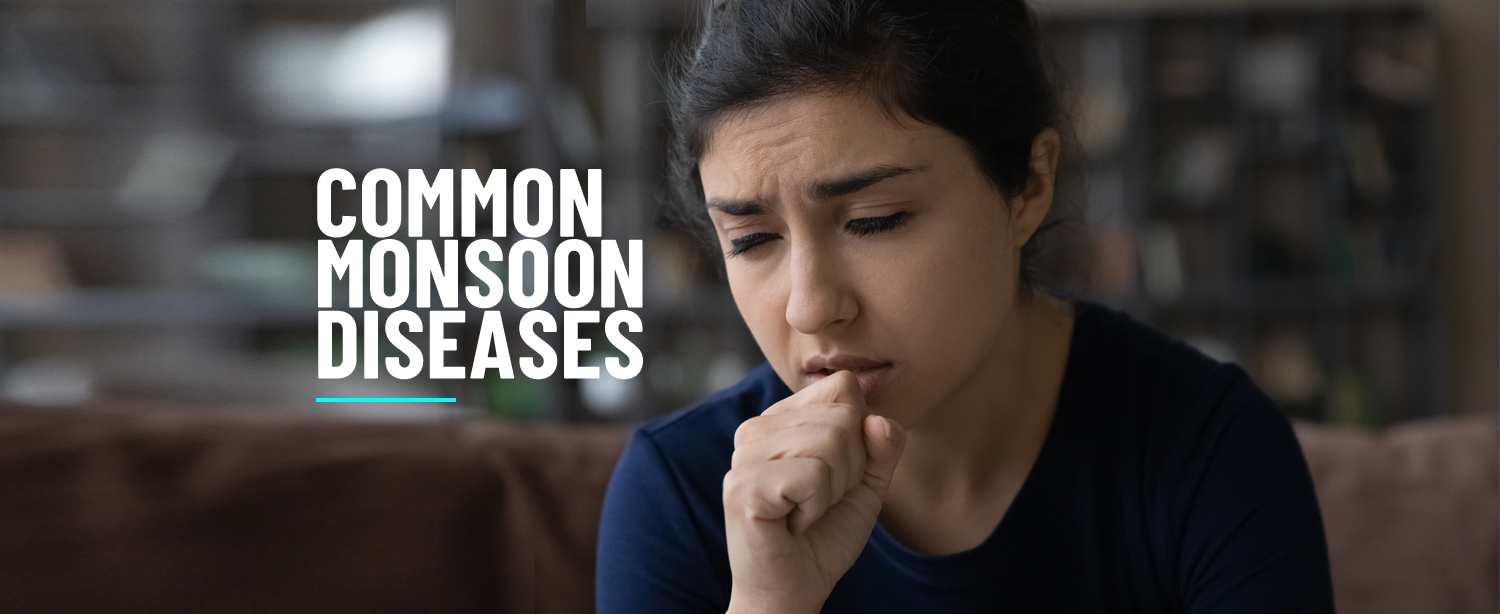Looking forward to get wet on a rainy day? Or are you afraid of contracting monsoon diseases? The monsoon season in India is lovely, but it brings with it a host of viral and bacterial infections and disorders. Infected bacteria and viruses produce monsoon diseases, which can be avoided by adopting safety measures. Individuals with a weakened immune system and poor digestive health are more susceptible to viral and bacterial infections. Certain monsoon illnesses may need hospitalization and may prove fatal too. It is important to be aware of common monsoon illnesses and take precautions to stay safe and protected.
Common Monsoon Diseases
During the monsoon, your chances of contracting various viruses, germs, and other diseases are two times higher than during any other season. The high moisture content in the air encourages the growth of harmful microorganisms, resulting in the spread of a variety of diseases. Many of these monsoon diseases go undiagnosed and untreated until they have a major impact on your health. Early diagnosis and basic preventive and hygiene measures can keep you safe and healthy during the monsoon. Some of the most common monsoon diseases include:
- Cold and Flu
The drastic fluctuation of temperature which happens during this rainy season makes the body susceptible to bacterial and viral attacks, resulting in cold and flu. This is the most common form of viral infection, consumption of a healthy and nutritious diet and staying hydrated helps strengthen your immunity. - Viral fever
Viral fever is another common monsoon disease that may cause the body temperature to rise as high as 104 °F and trigger many related problems such as constant sneezing, sore throat and even breathing problems. - Malaria
Malaria, caused by a single-celled parasite called Plasmodium, is one of the major health concerns in India during monsoons. It is the breeding season for mosquitoes Anopheles minimus that is a host to this malaria-causing parasite. It is accompanied by a high fever and shivering. - Dengue
Dengue causing Aedes aegypti mosquito breeds in stagnant water (such as in buckets, drums, flower pots). Dengue symptoms are high fever, low platelet count, rashes, hypersensitivity amongst other things. The incubation period of dengue fever is four to seven days after being bitten. - Chikungunya
Chikungunya, caused by the Aedes albopictus mosquito, is a non-fatal viral disease. The disease is known to show distinct arthritic symptoms that include pain in the joints and bones, and stiffness. - Cholera
This is a water-borne infection, caused by many strains of bacteria called Vibrio cholera. Cholera affects the gastrointestinal tract causing severe dehydration and diarrhoea. Follow high standards of hygiene, drink boiled water and eat homemade food. - Diarrhoea
This widespread bowel disease is caused due to the consumption of unhygienic foods and water. Diarrhoea is a highly preventable and treatable disease if the required health precautions are followed. - Typhoid
Typhoid fever is a result of contaminated food and water. This is yet another bacterial infection caused by Salmonella typhi. Maintaining proper hygiene and sanitation and at the same time using clean water is recommended. Fever, headache, weakness, pain and sore throat are some symptoms of typhoid. Stay away from street food and drink boiled water. - Leptospirosis
This is caused due to contact with dirty water or mud during the monsoons. It is spread from the urine or faces of infected animals when you walk through flooded areas. - Jaundice
Jaundice, a water-borne disease is contracted through contaminated food and water, and poor sanitation. It causes liver dysfunction, along with symptoms like weakness and fatigue, yellow urine, yellowing of eyes, and vomiting. Consume only boiled drinking water to avoid stomach infections
Monsoon Diseases – Preventive Measures
1. Here are a few tips to stay safe from mosquito-borne diseases:
- Use mosquito nets in your house.
- Don’t allow water to stagnate or collect anywhere in and around the house.
- Maintain high personal hygiene.
- Keep your surroundings clean.
- Use mosquito repellents if required.
- Wear clothes with full sleeves while stepping outdoors.
2. Here are a few tips to stay safe from water-borne and food-borne diseases:
- Boil your drinking water regularly.
- Wash you fruits and vegetables thoroughly before consumption.
- Keep your foods covered at all times and avoid consumption of street food.
- Make sure food is prepared in a safe manner.
- Ensure high levels of personal hygiene.
- Get your children vaccinated as per schedule.
3. Here are a few tips to stay safe from air-borne diseases:
- Cover your mouth and nose while coughing or sneezing.
- Wash your hands with soap and water frequently.
- Use a hand sanitizer when outdoors.
- Stay away from sick individuals.
- Ensure your homes are well-ventilated at all times.
Make sure you protect yourself and your family from these dangerous diseases this monsoon season. In case you develop symptoms of any of the monsoon illnesses, do seek medical care at the earliest. Timely testing helps in early diagnosis and prompt treatment. Doctors at Kokilaben Dhirubhai Ambani Hospital are available to assist you with simple as well as complex health concerns. Call 022 42696969 for appointments. Please find the below website link for further details: https://www.kokilabenhospital.com


